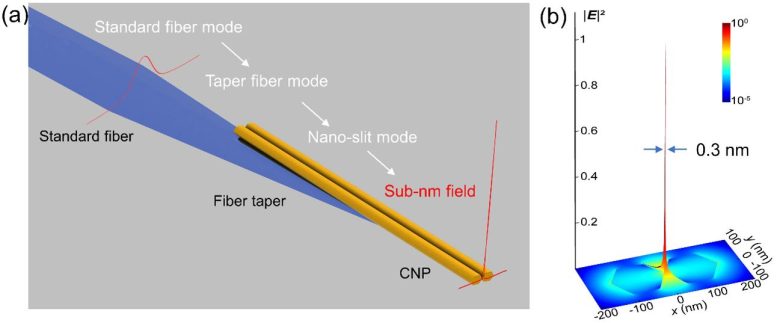Light is extremely confined in a nanoslit in a coupled-nanowire-pair. Credit: Zhejiang University Nanophotonics Group led by Limin Tong
Waveguiding scheme enables highly confined subnanometer optical fields.
Researchers have pioneered a novel method for confining light to subnanometer scales. This development offers promising potential for advancements in areas such as light-matter interactions and super-resolution nanoscopy.
Advancements in Light Confinement Technology
Imagine shrinking light down to the size of a tiny water molecule, unlocking a world of quantum possibilities. This has been a long-held dream in the realms of light science and technology. Recent advancements have brought us closer to achieving this incredible feat, as researchers from Zhejiang University have made groundbreaking progress in confining light to subnanometer scales.
Traditional Methods and New Discoveries
Conventionally, light localization beyond its usual diffraction limit has relied on two methods: dielectric confinement and plasmonic confinement. However, challenges such as precision fabrication and optical loss have obstructed the confinement of optical fields to sub-10 nanometer (nm) or even 1-nm levels. Now, a novel waveguiding scheme detailed on July 7 in the journal Advanced Photonics is set to harness the potential of subnanometer optical fields.
Waveguiding scheme to generate a sub-nm-confined optical field in a nano-slit mode. (a) Schematic illustration of the CNP waveguiding scheme. (b) 3-D plot of the cross-sectional field intensity distribution of the nano-slit mode. Credit: Yang, Zhou, et al., doi 10.1117/1.AP.5.4.046003
Consider this scenario: light, originating from a standard optical fiber, undertakes a transformative journey. It passes through a fiber taper and reaches its final destination in a coupled-nanowire-pair (CNP). Here, the light transforms into a unique nano-slit mode, creating a confined optical field that can be as minute as a fraction of a nanometer (approximately 0.3 nm). Astonishingly, this innovative approach boasts an efficiency of up to 95 percent and a high peak-to-background ratio, thus opening up an array of opportunities.
Extending the Boundaries of Nano-Exploration
The ground-breaking waveguiding scheme broadens its scope to the mid-infrared spectral range, further extending the limits of the nano-universe. Optical confinement can now reach an extraordinary scale of approximately 0.2 nm (λ/20000), which opens more avenues for exploration and discovery.
Professor Limin Tong of the Zhejiang University Nanophotonics Group notes, “Unlike previous methods, the waveguiding scheme presents itself as a linear optical system, bringing a host of advantages. It enables broadband and ultrafast pulsed operation and allows for the combination of multiple sub-nanometer optical fields. The ability to engineer spatial, spectral, and temporal sequences within a single output opens up endless possibilities.”
Potential Applications and Future Prospects
The potential applications of these breakthroughs are indeed breathtaking. The possibility of an optical field so localized that it can interact with individual molecules or atoms opens up potential for progress in areas like light–matter interactions, super-resolution nanoscopy, atom/molecule manipulation, and ultrasensitive detection. We are on the verge of a new era of discovery, where the tiniest realms of existence are now within our reach.
Reference: “Generating a sub-nanometer-confined optical field in a nanoslit waveguiding mode” by Liu Yang, Zhanke Zhou, Hao Wu, Hongliang Dang, Yuxin Yang, Jiaxin Gao, Xin Guo, Pan Wang and Limin Tong, 7 July 2023, Advanced Photonics.
DOI: 10.1117/1.AP.5.4.046003
>>> Read full article>>>
Copyright for syndicated content belongs to the linked Source : SciTechDaily – https://scitechdaily.com/shrinking-light-nanoscale-optical-breakthrough-unlocks-a-world-of-quantum-possibilities/












